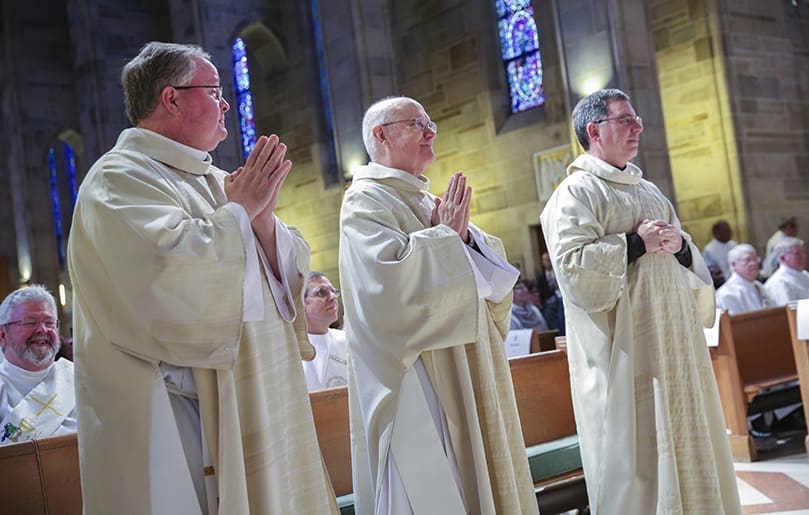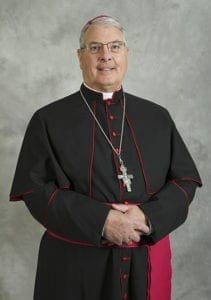 Photo By Michael Alexander
Photo By Michael Alexander Archbishop Gregory J. Hartmayer, OFM Conv., is the seventh Archbishop of Atlanta. In “Peace and All Good,” he shares pastoral reflections.
Archbishop Gregory J. Hartmayer, OFM Conv., is the seventh Archbishop of Atlanta. In “Peace and All Good,” he shares pastoral reflections.The role of deacons
By ARCHBISHOP GREGORY J. HARTMAYER, Commentary | Published February 5, 2021 | En Español
On Feb. 6, seven men will present themselves to me in the Cathedral of Christ the King, and I will be honored to ordain them to the Order of Deacon. Six will be ordained permanent deacons and one a transitional deacon. A transitional deacon eventually becomes a priest whereas a permanent deacon serves the church in that order until death.

Archbishop Gregory J. Hartmayer, OFM Conv.
The Archdiocese of Atlanta is blessed to have 300 plus permanent deacons serving in a variety of capacities in parishes, schools, chaplaincies and other entities.
Stephen, one of the seven deacons mentioned in the Acts of the Apostles, was stoned to death outside the walls of Jerusalem because he was a disciple of Jesus Christ. He became the first martyr of the church, and his feast is celebrated on the day after Christmas.
The Apostles assured the first deacons that when they acted out of love, the Spirit of God would be with them in their struggles to find the words and the courage to confront evil and hurt and to challenge those who threatened to harm them and those they loved.
All of us have seen this kind of perseverance in parents who continue to love their sons and daughters despite the messes they make of their lives; in couples who will not quit on each other but work together to mend their marriage; in those quiet, committed souls who do their jobs conscientiously not because of the money or demanding supervisors, but because they know their work matters.
The Order of Deacon provides them and the church an opportunity to benefit from the grace of the sacrament of Holy Orders.
Jesus uses diaconal ministry to save us from abandoning people because they are too difficult for us to accept and welcome. A deacon of the Catholic Church is not primarily a psychologist, social worker or counselor. A deacon is one who, like his master, goes out to the poor, the lowly, the rejected and those in the shadow of death.
He does so, not at a distance, but through identification: he becomes poor with the poor, he suffers with those who suffer; he enters into the hopelessness of the desperate in order to convince them that nothing can ever come between them and the love of Jesus Christ.
Pope Francis wrote in Evangelii Gaudium: “Any Church community, if it thinks it can comfortably go its own way without creative concern and effective cooperation in helping the poor to live with dignity and reaching out to everyone, will also risk breaking down, however much it may talk about social issues or criticize governments. It will easily drift into a spiritual worldliness camouflaged by religious practices, unproductive meetings and empty talk.” Deacons are ordained to share their love with Christ and his church. They should call upon Mary, the virgin mother of God, and Joseph, her most chaste spouse, to bless the good work they do. They should strive to imitate their examples of faith and courage. Mary simply said, even in her moment of doubt and uncertainty, “I am the servant of the Lord.”
Our newly ordained deacons will become ministers of the altar. They will proclaim the Gospel, prepare the sacrifice and distribute the Lord’s Body and Blood to the faithful.
Furthermore, it will become their duty, at the archbishop’s direction, to exhort believers and unbelievers alike and to instruct them in church doctrine. They will preside over public prayer, administer baptism and assist at and bless marriages, bring the Eucharist to the dying and conduct funeral rites.
During the ordination rite, they promised to pray the Liturgy of Hours for the church and for the whole world. They cannot be a servant in the spirit of Jesus unless they pray constantly, unless they give themselves to a regular contemplation of the beauty that has appeared in the incarnation now present in the Blessed Sacrament.
In praying the Liturgy of Hours, day in and day out, they will be drawn into intimacy with the Lord. They will find themselves more and more conformed to the image of Christ. Prayer is not optional for the deacons of the church. It is their lifeblood, their source of inspiration; it is an indispensable support. Those seven men have been called to proclaim the Gospel and help people hear the story as their own and use the particular gifts God has given them. They can help us connect life to faith. St. Paul reminds them to use their different gifts in accordance with the grace that God has given to each of them.
The love they share with us is the same love that Christ offered in giving them a vocation. They should always remember that it was Christ who called them; it is he who chose them.
Those men have been called to selflessly and humbly serve God’s people. We thank God for their generosity and for saying “yes” to his call.